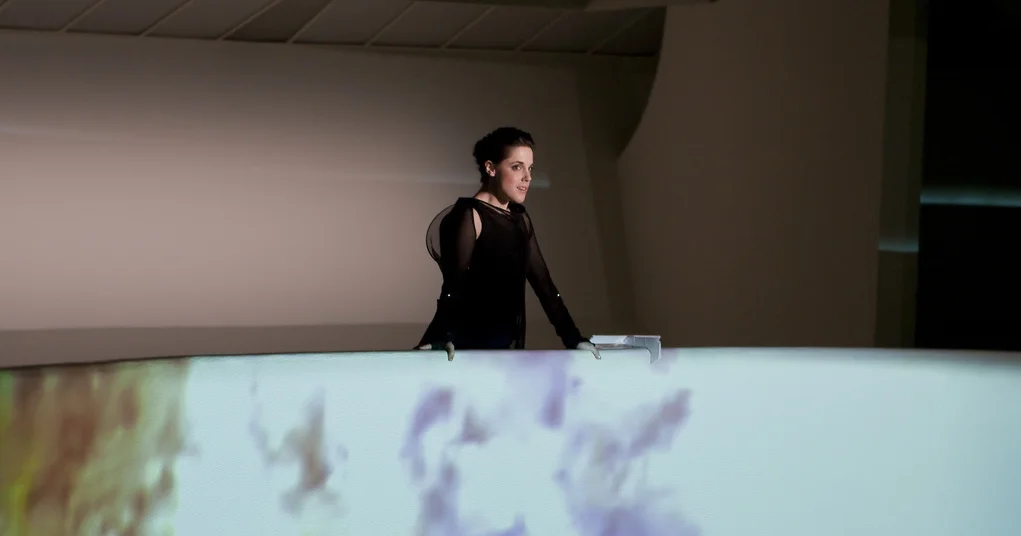"A SOPRANO OF EXTRAORDINARY AGILITY AND CONCENTRATION"
- THE NEW YORK TIMES
"AN AGILE SOPRANO WITH A LIVELY, FLEXIBLE INTERPRETIVE PERSONALITY"
- THE NEW YORK TIMES
"SENSATIONAL"
- THE BOSTON GLOBE
Critically acclaimed as “a soprano of extraordinary agility and concentration” by The New York Times, soprano Mary Mackenzie has emerged as one of contemporary music’s most compelling storytellers. With a career that has taken her to performances in 11 U.S. States and Washington D.C., as well as a seasoned discography spanning eleven years, Ms. Mackenzie is particularly known for her evocative chamber music performances. For her efforts, she has earned praise for a “sensational, epically unsettling” rendition of George Crumb by the Boston Globe and her “mystifying” vocal effects by The Financial Times.
Examples of some of her most immersive work to date includes several “one-woman” performances, like the United States premiere of Héctor Parra’s monodrama Hypermusic: Ascension at the Guggenheim Museum, a highly technological experience which utilized Harvard professor of theoretical physics Lisa Randall as librettist. At the Bravo! Vail Festival, Ms. Mackenzie performed and designed the storyline for a cabaret-style, costumed and staged rendition of De Leeuw - Im wunderschoenen Monat mai, a Pierrot-style “recomposed” adaptation of works by Schumann and Schubert, with new music collective Le Train Bleu—she has since continued to perform the work with the Redlands Symphony and with The Knights ensemble. Elsewhere, she has performed chamber music with American Contemporary Music Ensemble, the Chameleon Arts Ensemble, Ekmeles, the Da Capo Chamber Players, Collage New Music, Fulcrum Point, and the Talea Ensemble, among many others.
In keeping with her contemporary bonafides, she has performed leading roles in world premieres of numerous operas, including as Sister Leonide (Mata Hari by Matt Marks), Despina (Cosi faran tutti by Jonathan Dawe), and Angelica (Cracked Orlando by Jonathan Dawe). Ms. Mackenzie finds particular enjoyment in the collaborative element of designing new work in tandem with the fresh ideas of emerging composers, and in that vein has premiered over 20 works.
Ms. Mackenzie’s discography includes five albums of collaborations with a bevy of modern composers. On Albany Records, she has frequently collaborated with the MacArthur Grant awardee composer John Harbison on albums such as Vocalisms: Songs of Daniel Crozier, John Harbison, James Primosch, and Ned Rorem; Closer to My Own Life with the Albany Symphony; Songs After Hours (a World Premiere). Her other album work includes Cathedral Music with The 21st Century Consort, Louis Karchin: To the Sun and Stars on Bridge Records, and The Opera America Songbook.
As soloist, Ms. Mackenzie has collaborated with the Albany Symphony, Phoenix Symphony, American Symphony Orchestra, the Juilliard Percussion Ensemble, and the Borromeo String Quartet. Particularly dear to her heart was a performance of Boulez’s Improvisations sur Mallarmé Nos. 1 & 2 for the composer’s 85th birthday celebration at Columbia University’s Miller Theatre, as well as a performance of Elliott Carter’s Warble for Lilac Time with the American Symphony Orchestra at Carnegie Hall. Occasionally found in traditional opera productions, Ms. Mackenzie made her professional opera debut as Despina (Così fan tutte) at Madison Opera, and has appeared as the soprano soloist (Carmina Burana) with both the Grant Park Symphony Orchestra and the Phoenix Symphony.
Originally from Madison, WI, Mary Mackenzie holds education from The Manhattan School of Music (M.M.) and the Cleveland Institute of Music (B.M., Professional Studies Certificate). She lives with her husband Barry in Worcester, MA, where she enjoys running, baking, and photography.
